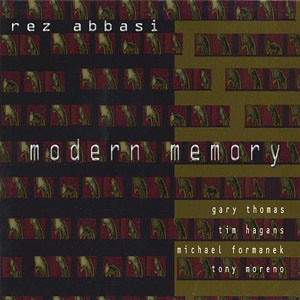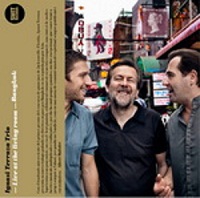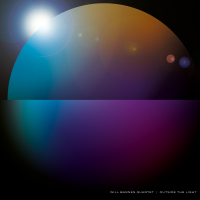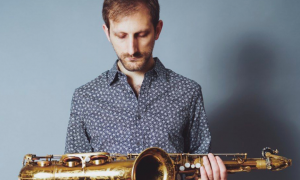Home » Jazz Articles » Interview » Rez Abbasi: Thoroughly Modern Marvel
Rez Abbasi: Thoroughly Modern Marvel
 Saxophone
Saxophone AAJ: You produce your own projects.
RA: Yes. I think most jazz musicians do that now because given the state of the industry, how much money can you really afford? But even aside from that for me it's more about the fact that I know the music better than anybody and I know what I'm trying to convey. So essentially I don't know if I trust anybody enough to come and mess with the vision, especially if I'm going to pay them on top of that. I think I've got big ears and I'm happy with my own production skills.
AAJ: Sonny Sharrock always spoke about the guitar with something like disdain. He was asthmatic, couldn't play saxophone and said he was trying to achieve on the guitar what he heard John Coltrane doing, especially later period with over-blowing and things like that. Someplace else you made mention of the fact that you generally have two tones, one of them was kind of a cleaner jazz tone and one of them was more overdriven. You said that was your saxophone tone.
RA: Really? He said those things? That's interesting. My comments were from a blog I wrote recently for Guitar Player Magazine on the idea of shredding and how I have disdain for that word because of the correlation with rock and heavy metal. And not that that music's bad, I love some of that stuff as well. But we are talking about jazz and there are a lot of intricacies that go on with creating a vocabulary in jazz. I can only speak for myself but with thousands of hours working on that and when you have an overdriven sound suddenly people relate to this other kind of thing that has nothing to do with jazz. So for me that overdriven sound, yes, that's something that reminds me more of a saxophonist because it cuts through the band. You don't hear a saxophonist as being dull when you hear he or she in the context of a quartet or a quintet. It cuts through the band and yet it's within the realm of the band as well. So, a clean jazz guitar just does not do that. It's a different take on the guitar and it sounds equally as beautiful but when you want that kind of push of the band I think the overdriven sound really helps.
AAJ: Is the saxophone the preeminent post-war jazz instrument? Excepting maybe Miles Davis?
RA: Yeah, I think the saxophone can be seen as the number one or the preeminent jazz instrument. Well, people would argue that the trumpet, maybe because of Louis Armstrong, but I think the general public would probably say the saxophone.
AAJ: And do you think about where the guitar fits in the hierarchy or the history of jazz and lineage of jazz?
RA: I try not to because it depresses me. The guitar is making strides and there are some leader-type guitarists that really have helped. People like John McLaughlin and Wes Montgomery before that, obviously. But I'm saying post-'70s, McLaughlin, Pat Metheny, Frisell, etc., etc. You know, these are leaders on the guitar, you can hear that in their music. But in history the guitar, it's sort of like the vibraphone, it's sort of an under the radar instrument, maybe even underrated.
AAJ: Underutilized?
RA: Underutilized, definitely. In some ways I can see why. The piano's so beautiful and striking, it sounds so good with like a ride cymbal, you know [laughs]? I don't blame anybody but this is just seems to be what the truth is of this particular situation. But I think there's an opening now that the guitar can be part of. It's continually opening up doors where with some other instruments, you know, you have Coltrane, you have certain people who've made the mark on those instruments and it's hard to imagine anybody going too much further than that.
Or the piano for that matter. Art Tatum to Keith Jarrett. I mean, wow! What are you going to do? With the guitar, it's still in the baby steps in some fashion because also with the guitar you have electronics, with the electric guitar. You can manipulate the sound, that's innate within the electric guitar to do that. I'm a big guitar fan, I love the guitar because I love the plucked instrument. The fact that you can use different tools as a plucking mechanism, like a plectrum, you can use all kinds of different ways of plucking these stringed instruments and that's in itself a really great thing to have.
Guitar Talk
AAJ: Do you ever use an Ebow or anything like that?

RA: I have used it; I used it on my wife's last record. She was doing a sort of a slow version of a Qawwali tune and I wanted to create that atmospheric vibe. I love it, it was fun.
AAJ: You touch on the notion of manipulating the strings or different things you can pluck with and that was another thing that Sharrock spoke of, which was the guitar was second only, for him, the saxophone which he said had the breath of life. But the guitar was the second most expressive because you could really work it physically. He played a Les Paul through a Marshall stack, but said his tone was in his fingers.
RA: It is definitely in your fingers but it's also in your musical sense. You can pluck harder than the next guy and that's going to make you sound a particular way. So it's also the actual muscle that goes into the playing. But there's no question about it, I think it's your overall self that is played, you know, to get to that music. To get to the music it's all areas of your body that are doing it. Your fingers because it's the one thing that directly connects to the instrument, sort of interfaced with the instrument. But it's your whole body that's interfaced with the music.
AAJ: McCoy Tyner said music shouldn't be the sole focus of an artist's life. It is interesting to roll that around in your head because, as you said earlier, at certain times in your life it's all you do because you have to build your technique and your study. But you've mentioned boxing a lot and, you've used it as a metaphor a couple of times. Are there other interests you that you have that come back into your music.
RA: Reading. I love reading philosophy and psychology, those two topics I've been back to several times. And sports, there's some great ideas floating around in the sports world. I just read this book called The Fighter's Mind (Grove Press, 2010) [by Sam Sheridan] which is unreal. It's about boxing but it's really about the mind. I'm very much into psychology. Other than that, I think the normal thing that everybody likes, food, film. It's nothing different; everybody has their few things that they love outside of music. But without music I would feel emptiness, I think. So, whether music is a hundred percent or not, it's up there. I haven't gotten to the point that I can move away from that.
AAJ: And married to a musician, you're surrounded by music. Literally, figuratively.
RA: Exactly. And she's kind of like me. She's really into doing it right and discipline and you gotta do your practicing, all these things. Composing, she's always writing new tunes. So, maybe we'll both decide one day that there's other stuff that's more important than music. But right now, why not stick with the music?
Selected Discography
Rez Abbasi's Invocation, Suno Suno (Enja, 2011)
Kiran Ahluwalia, Aam Zameen: Common Ground (Avakado Artists, 2011)
Rez Abbasi Acoustic Quartet, Natural Selection (Sunnyside, 2010)
Rez Abbasi, Things To Come (Sunnyside, 2009)
Rudresh Mahanthappa's Indo-Pak Coalition, Apti (Innova, 2009)
Dave Pietro, The Chakra Suite (Challenge, 2008)
Kiran Ahluwalia, Wanderlust (Four Quarters Entertainment, 2007)
Rez Abbasi, Bazaar (Zoho, 2006)
Rez Abbasi, Snake Charmer (Earth Sounds, 2005)
Sunny Jain Collective, Mango Festival (Zoho Music, 2004)
Marc Mommaas, Global Motion (Sunnyside, 2003)
Photo Credits
All Photos: Courtesy of Rez Abbasi
Tags
Rez Abbasi
Interview
Lawrence Peryer
DL Media
United States
New York
New York City
Dan Weiss
Carlos Santana
B.B. King
Larry Carlton
Robben Ford
Joe Pass
Allan Holdsworth
Shakti
john mclaughlin
Louis Armstrong
Zakir Hussain
Ray Speigal
Joe Diorio
Ted Green
Peter Sprague
John Abercrombie
Rodney Jones
Jack Wilkins
Kenny Werner
Paul Motian
John Hebert
Satoshi Takeishi
Ron Carter
Bill Frisell
joe lovano
Bill Ware
Stephan Crump
Eric McPherson
Rudresh Mahanthappa
Vijay Iyer
Sonny Sharrock
John Coltrane
Miles Davis
Wes Montgomery
pat metheny
Art Tatum
Keith Jarrett
McCoy Tyner
PREVIOUS / NEXT
Rez Abbasi Concerts
Support All About Jazz
 All About Jazz has been a pillar of jazz since 1995, championing it as an art form and, more importantly, supporting the musicians who make it. Our enduring commitment has made "AAJ" one of the most culturally important websites of its kind, read by hundreds of thousands of fans, musicians and industry figures every month.
All About Jazz has been a pillar of jazz since 1995, championing it as an art form and, more importantly, supporting the musicians who make it. Our enduring commitment has made "AAJ" one of the most culturally important websites of its kind, read by hundreds of thousands of fans, musicians and industry figures every month.





















